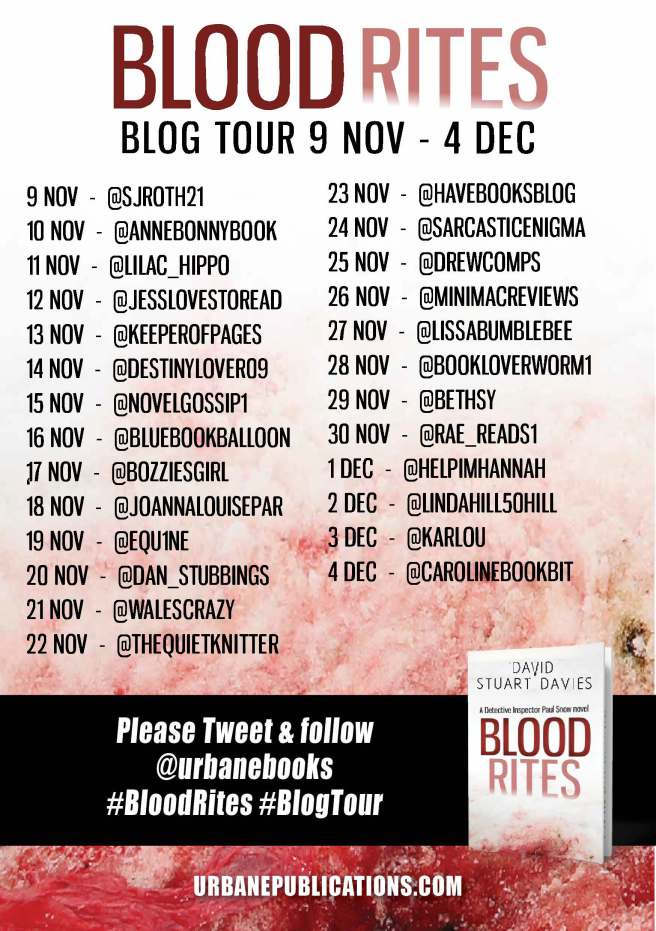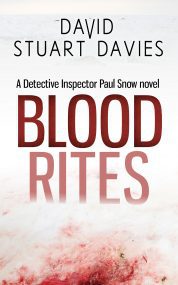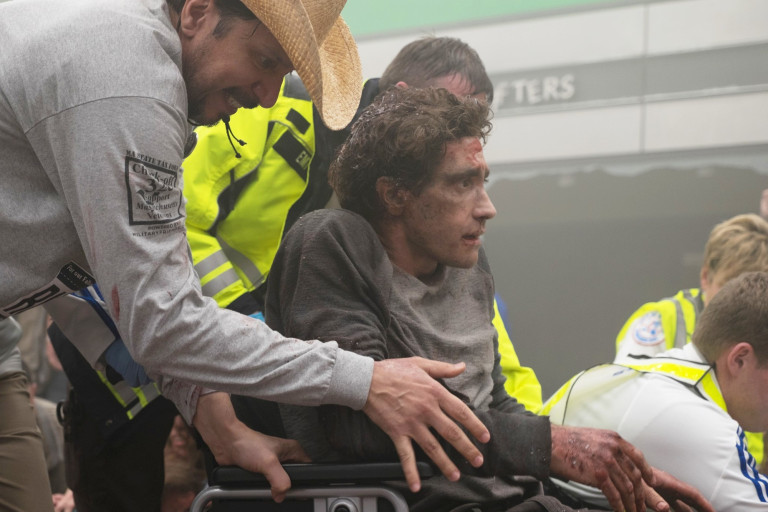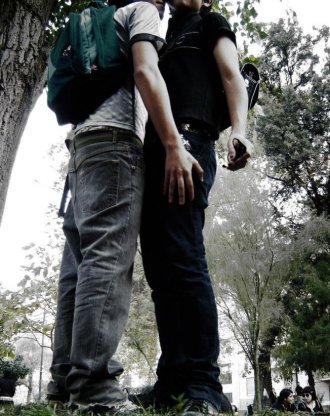
Synopsis: Blood Rites is a Northern thriller set in Huddersfield, Yorkshire in the 1980s featuring Detective Inspector Paul Snow. DI Paul Snow has a personal secret. He is a homosexual but is desperate to keep it secret, knowing it would finish his career in the intolerant police force of the time. As this personal drama unfolds, he is involved in investigating a series of violent murders. All the victims appear to be chosen at random and to have no connection with each other. After the fourth murder, Snow is removed from the case for not finding the killer but continues investigating the matter privately. Gradually, Paul manages to determine a link between the murder victims, but this places his own life in great danger. Can Paul unmask the killer as he wrestles with his own demons?

Guest post: Keep ‘Em Guessing
As a writer of crime fiction novels, I have always worked on the principle that while the opening section of your story must be entertaining, it must also be a little mystifying to the reader. You have to intrigue them, make them want to delve further into the text, to stay with the story. If your opening section is too simple, too predictable you are prompting fading interest and yawns. Once the readers have made it to page fifty, they will either give up and turn to another volume or carry on with enthusiasm. It is at this point some clarity and real page-turning elements need to be employed.
In Blood Rites, my new crime novel, I played a few intriguing tricks to snare the reader. The book opens with the final section of the last chapter. It does not give any clues or indeed the game way but I hope it surprises and fascinates in order to prompt the reader to see what the whole thing is about. The purpose of this ploy only becomes clear at the end.
Around Chapter Three, without explaining the concept, I introduced the idea of the domino. Or to be precise a line of dominoes, all set up just waiting for one to fall thus setting off a destructive chain reaction as it does. The domino effect becomes clearer as the novel progresses but the first domino, a character called Barry ‘Bazzer’ Donovan, really has no connection with the main thrust of the plot. This was deliberate. In one sense he is an innocent pawn in the chain of events but he is also an essential component of the process. He is the spark that ignites the action. There is irony here too, for while I referred to Barry as ‘an innocent pawn’ he is far from a pleasant or blameless character.
Enough waffle from me. Here is a section of the novel that uses Barry and the domino idea. This, I think, will speak more eloquently to you that I can.
EXTRACT
Sometimes FKeepsets up a row of dominos and just gives the first one a gentle push and stands back and watches with dark satisfaction the resulting chain reaction and the chaos, confusion and tragedy the clattering falling pieces initiate. Certainly this was the case with Barry ‘Bazzer’ Donovan.
He was the first domino.
If a film producer was making a film about a disaffected fourteen year old from a sink estate, Bazzer Donovan would have been ideal casting. He was small and under nourished for his age, with narrow deep-set haunted eyes and a feral loping walk. He looked forever furtive and angry. It was an anger that he could not explain. It was just there bonded to his soul and this made him very dangerous. His teachers, his social worker and his mother had all given up on him. There was no reasoning with the creature. He had become a law unto himself, wandering the streets of Deighton at all hours causing problems: stealing, damaging cars, drinking, lighting fires, fighting and taking drugs.
He was particularly disaffected this particular evening. On returning home he found that his stupid mother had gone off to the fuckin’ bingo and not left any food in the house. The cow had done it on purpose. The cow! He hated her! The volcanic anger that was always on the verge of erupting within him, spurted forth. He roamed the house smashing up some crockery, ornaments and furniture and then poured a bucket of water on his mother’s bed. See how the fat cow liked sleeping on that. He grinned at the thought, but there was no joy or humour there, just malice.
Satisfied that he had done all he wanted in the house, he swept out slamming the door as hard as he could. His anger had not abated. If anything it burned with greater ferocity. He was still hungry and he had no money at all. Not even a few bob to buy his tea at the chippy. Well, he wasn’t going to fuckin’ starve. He’d just have to get some fuckin’ money somehow. And he knew how.
He found himself passing by Wentworth House flats, a multi-story structure built in the sixties by the council and considered at the time a smart modern housing unit. Now it was a crumbling slum, unloved and in need of demolition. Peeling paint, boarded windows, walls smeared with graffiti and worse, a lift that had not worked in years and was used as a toilet were now the charms of Wentworth House. Only the desperate, the destitute, the serially unemployed and the mentally unstable inhabited this place.
Bazzer saw a lean figure emerge from the building. A tall man, smartly dressed, walking with a swift and urgent step. To Bazzer, he didn’t look like one of the inmates of Wentworth House. He was too clean, too upright, too normal. A visitor then. By the look of his clothes, he could be someone from the council, or a doctor or maybe a bleedin’ undertaker. They had a lot of deaths in Wentworth House.
Quickening his step, Bazzer caught up with the man.
‘Ere mate,’ he called, his thin strident tone piercing the silence of the darkened street.
The man stopped in his tracks and turned round.
‘Ere mate, I got something for you.’
The man looked quizzically at this strange urchin who had materialised out of the night.
‘Yes,’ he said.
The next thing the man knew was a sudden harsh pain to his face and a blinding light. He fell to his knees and tried to look up, just as Bazzer hit him again with the half brick. This time he fell back into the gutter, unconscious.
The youth stood over his victim for some time. He was waiting to see if the bastard moved, if he really was unconscious or faking it. Of course, he could be dead. That would be really cool. But no, he could see his chest rise and fall.
Bazzer knelt down by the unconscious man and rifled his pockets. It was slim pickings. Five bob in his trouser pocket and less than a fiver in his wallet.
Fuckin’ cheap skate.
He stood up and snarled his disappointment, giving the man a frustrated kick in the ribs. We walked off slowly in the direction of Brian’s Chippy.
Some five minutes later, the man regained consciousness and slowly, very slowly, he sat up. He had a thunderous headache and his fingers, gently caressing his forehead established that he had a cut there and it was still bleeding. Well, at least he was alive. He had to thank God for that.
With infinite care, he pulled himself to his feet and waited a moment while the world around him steadied itself before slowly taking a few steps in the direction of home. There was no sign of his assailant, of course. Well, there wouldn’t be, would there? He felt inside his coat to discover that his wallet had gone. He sighed heavily: he was too tired and distressed to swear. Well, he thought, as he made slow progress down the street, there was no point in going to the police. They wouldn’t heal his wound or get his money back. He didn’t quite know then what a very deep, life-changing impression that brief but brutal encounter with the young brick-wielding hooligan would have on his life and that of others.
The first domino had fallen and the inevitable demolishing process had begun.
Author bio:

David Stuart Davies is an author, playwright and editor. His fiction includes six novels featuring his wartime detective Johnny Hawke, Victorian puzzle solver artist Luther Darke, and seven Sherlock Holmes novels – the latest being Sherlock Holmes and the Ripper Legacy (2016). His non-fiction work includes Starring Sherlock Holmes, detailing the film career of the Baker Street sleuth. David has also penned a Northern Noir trilogy of gritty crime novels set in Yorkshire in the 1980s: Brothers in Blood, Innocent Blood and Blood Rites.
David is regarded as an authority on Sherlock Holmes and is the author of two Holmes plays, Sherlock Holmes: The Last Act and Sherlock Holmes: The Death and Life, which are available on audio CD. He has written the Afterwords for all the Collector’s Library Holmes volumes, as well as those for many of their other titles.
He is a committee member of the Crime Writers’ Association and edits their monthly publication Red Herrings. His collection of ghost and horror stories appeared in 2015, championed by Mark Gatiss who said they were ‘pleasingly nasty.’
David is General Editor of Wordsworth’s Mystery & Supernatural series and a past Fellow of the Royal Literary Fund. He has appeared at many literary festivals and the Edinburgh Fringe performing his one man presentation The Game’s Afoot – an evening with Sherlock Holmes & Arthur Conan Doyle. He was recently made a member of The Detection Club.
Authors Links: Website / Twitter / Via Urbane
Advertisements Share this:




